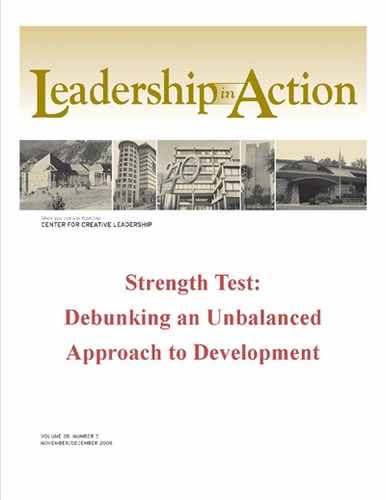DEFINING STRENGTHS
At first glance, aptitudes that qualify as strengths might seem self-evident, but in fact a deeper look is required to define strengths and how they relate to personal and organizational success.
For example, Robert W. Eichinger and his colleagues at leadership development consulting and research firm Lominger International, Guangrong Dai and King Yii Tang, considered different ways to define a strength. They identified several types of strengths, including
![]() What one does best (a personal best strength)
What one does best (a personal best strength)
![]() What one does better than other people (a competitive strength)
What one does better than other people (a competitive strength)
![]() What one does better than other people and few people are good at (a distinctly competitive strength)
What one does better than other people and few people are good at (a distinctly competitive strength)
![]() What one does better than others, few people are good at, and is aligned with what organizations most need from their managers (a distinctly competitive and aligned strength)
What one does better than others, few people are good at, and is aligned with what organizations most need from their managers (a distinctly competitive and aligned strength)
With these definitions in place, the researchers conducted a study to determine how many managers had the various types of strengths. They analyzed competency ratings for more than two thousand managers and executives and found that very few had five or more competencies at which they were stronger than most other managers. Even fewer—a mere one manager in thirty—had five or more strengths aligned with what organizations need from their managers to be competitive. The researchers concluded, therefore, that an exclusive reliance on strengths is a weak career strategy and that the best bet for driving organizational effectiveness through leadership development is to help leaders become ongoing learners who can regularly sharpen their current strengths and continue to acquire new capabilities to meet changing business demands and job requirements.
A focus on what managers are good at may turn attention away from what organizations need.
CCL researchers Jean Leslie and Anand Chandrasekar have also looked at the relationship between strengths and organizational needs. They analyzed the results of a survey that compared the skills and competencies that organizations need to be successful with the level of skills that the organizations' managers possessed in those areas. Across three distinctly different cultures—in the United States, Singapore, and India— they found remarkable similarity in the competencies organizations need most—for instance, leading people, strategic planning, managing change, and resourcefulness—and the competencies at which managers are most skilled—for example, respecting individual differences, doing whatever it takes, and cultural adaptability. More important, in all three countries there were major gaps between what organizations needed and the strengths their managers brought to the table. For instance, the skill of leading people was the most important competency for organizational success but was in the lower half of the current skill levels possessed by managers. The researchers concluded that encouraging managers to maximize their current strengths, to the neglect of developing areas of relative weakness, inevitably works to the detriment of organizational performance.
Thus there is strong evidence that focusing on what individuals are naturally good at fails to help them stand out in their careers. Worse still, a focus on what managers are good at may turn attention away from what organizations need from their leaders to be competitive in the global economy.
